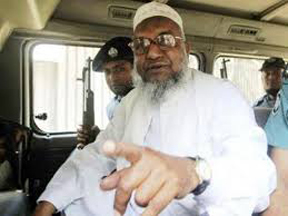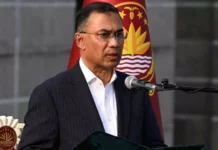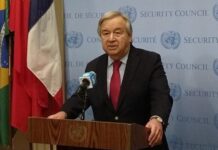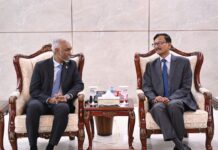 DHAKA: Bangladesh’s fundamentalist Jamaat-e-Islami chief Matiur Rahman Nizami was today sentenced to death by a special tribunal for the war crimes committed by him during the 1971 independence war against Pakistan.
DHAKA: Bangladesh’s fundamentalist Jamaat-e-Islami chief Matiur Rahman Nizami was today sentenced to death by a special tribunal for the war crimes committed by him during the 1971 independence war against Pakistan.
“He shall be hanged by neck until he is dead,” pronounced the chairman of the three-member panel of judges of Bangladesh’s International Crimes Tribunal Enayetur Rahim.
The ruling said Nizami deserved no punishment other than the death penalty for the gravity of crimes he had committed.
Eight of the 16 charges of war crimes against the 71-year-old Jamaat leader were proved beyond doubt.
Witnesses said Nizami was present on the dock and looked indifferent as the judges read out the 204-page judgment in turns which took more than an hour to be delivered.
The tribunal said Nizami misinterpreted Islam in carrying out the atrocities and as the then president of Islami Chhatra Sangha – the student wing of Jamaat – he turned the organization into infamous Al-Badr militia forces to carry out mass killings, particularly of the leading intelligentsia.
The panel convicted him of “superior responsibility” as the chief of Al-Badr militia for direct involvement in the killings and tortures in other charges.
Under the law for the war crimes trial, Nizami could challenge the verdict before the apex Supreme Court.
Nizami, a former minister in the BNP-led four party alliance government during its 2001-2006, was the last high-profile accused to be brought to justice on war crimes charges as the two special tribunals set up by the Awami League so far pronounced verdicts in 10 cases of war crimes.
The charges against Nizami include the murder of 70 people and torching of 72 houses in Pabna’s Bera Upazila, killing 450 people in Demra and Baushia villages and killing many more in front of a Hindu temple in Santhiya Upazila.
The judgment ended a major phase in the war crimes trial during the liberation war.
Paramilitary Border Guard Bangladesh and elite anti-crime Rapid Action Battalion have enforced a tight security vigil fearing reprisals from Jamaat activists after the verdict.
Meanwhile, hundreds of youngsters, who had rallied outside the court demanding “capital punishment” for Nizami, celebrated the ruling.
The tribunal on June 24 deferred Nizami’s verdict after the jail authorities reported that the accused was unable to appear in the court due to high blood pressure.
In consultation with both the prosecution and defense lawyers, the three-member panel of the tribunal deferred the verdict at that time.
During the indictment, Nizami had pleaded “not guilty” and said the then Pakistan People’s Party leader Zulfiqar Ali Bhutto was entirely responsible for the genocide in 1971.
Two special tribunals so far handed down death penalties to eight people on 1971 war crime charges and ordered two others to languish in jail until their death as they so far completed the trial of 11 war crimes key-accused.
Only one of them, Jamaat’s joint secretary general Abdul Quader Mollah has been executed.
Of the 10 convicts, eight are Jamaat stalwarts and the rest two are leaders of its crucial ally Bangladesh Nationalist Party (BNP) of ex-prime minister Khaleda Zia.
About three million people were killed by the Pakistani army and their Bengali-speaking collaborators during the liberation war, according to official estimates.
A special tribunal has already sentenced Nizami and 13 others, including a top leader of India’s separatist outfit ULFA, to death in the 2004 Chittagong arms cases.–PTI






